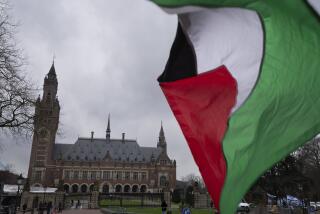No Compromise With Baghdad : Making the warning unmistakable
- Share via
Iraq continues to evade and defy the U.N. Security Council resolutions it was forced to accept after its defeat in Kuwait last year. Saddam Hussein’s game is obvious: Stall and stall some more, in the hope that eventually his antagonists will be distracted by other crises or grow so weary of the confrontation that they will be ready to compromise on Iraqi terms. But the Security Council and other U.N. bodies, to their credit, show no signs of bending. In response to Baghdad’s stonewalling and scorn for civilized norms, the United Nations is taking some of its toughest positions ever.
The U.N. Human Rights Commission did so this week, adopting a resolution condemning Iraq’s “massive violations of human rights of the gravest nature” and calling for U.N. General Assembly consideration later this year of a proposal to station a team of human-rights monitors in Iraq. The shocked commission acted after hearing a detailed report from former Dutch Foreign Minister Max Van der Stoel on his first-hand investigation of the Iraqi regime’s appalling record of mass killings and torture.
The Van der Stoel report follows by only a few days a U.S. proposal to the other four permanent members of the Security Council to begin using Iraq’s frozen overseas assets to pay the costs of destroying the weapons it has been ordered to give up; to compensate victims of its wartime aggression, and to finance humanitarian relief for suffering Iraqi civilians. Seizing the assets--about $5 billion worth, including $500 million in the United States--would be a response to Baghdad’s refusal to accept the U.N. plan to sell some of its oil to pay for these needs.
Meanwhile, impatience grows over Iraq’s refusal to destroy its ballistic-missile equipment or give U.N. inspectors access to its now-outlawed weapons facilities. U.S. officials have carefully left the door open to resumed military strikes on Iraqi weapons sites if defiance of U.N. disarmament resolutions continues. British Foreign Secretary Douglas Hurd now indicates that his country has not ruled out the option of joining in collective military action should Iraq’s “prevarications” continue.
There is no reason to doubt the seriousness of purpose behind these admonitions. The United Nations’ reviving prestige would suffer greatly if the resolutions on Iraq were not enforced. And it is almost impossible to conceive that the United States and its allies would do nothing while a defiant Iraq rebuilds its war-making capability. Powerful signals are being sent to Baghdad, and the warning they contain is unmistakable.
More to Read
Sign up for Essential California
The most important California stories and recommendations in your inbox every morning.
You may occasionally receive promotional content from the Los Angeles Times.













